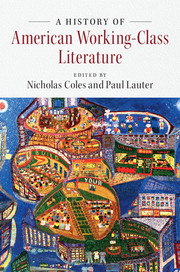Book contents
- A History of American Working-Class Literature
- A History of American Working-Class Literature
- Copyright page
- Contents
- Figures
- Contributors
- Acknowledgments
- Introduction
- Chapter 1 Transportation Narratives
- Chapter 2 Why Work?
- Chapter 3 Labor and Literary Culture in and Beyond Bondage
- Chapter 4 Lowell Mill Girls
- Chapter 5 “Wet Paper Between Us”
- Chapter 6 Millions and Mills
- Chapter 7 “We Are Not Slaves”
- Chapter 8 Utopian Labors
- Chapter 9 Toward a More Perfect Union
- Chapter 10 What Workers Were Reading, 1830–1930
- Chapter 11 Getting the Word Out
- Chapter 12 Genre and Form in Working-Class Life Writing, from Haymarket to the New Deal
- Chapter 13 Working the Fields
- Chapter 14 Proletarian Literature
- Chapter 15 Go Left, Young Women
- Chapter 16 “I Have Seen Black Hands”
- Chapter 17 The American Labor Song Tradition
- Chapter 18 Prison Literature from the Early Republic to Attica
- Chapter 19 The Workers’ Theatre of the Twentieth Century
- Chapter 20 The Evolution of the Poetry of Work
- Chapter 21 The Labor Plot
- Chapter 22 Globalization, Migration, and Contemporary Working-Class Literature
- Chapter 23 Narrating Economic Restructuring
- Chapter 24 A Turn of the Sphere
- Works Cited
- Index
- References
Works Cited
Published online by Cambridge University Press: 18 July 2017
- A History of American Working-Class Literature
- A History of American Working-Class Literature
- Copyright page
- Contents
- Figures
- Contributors
- Acknowledgments
- Introduction
- Chapter 1 Transportation Narratives
- Chapter 2 Why Work?
- Chapter 3 Labor and Literary Culture in and Beyond Bondage
- Chapter 4 Lowell Mill Girls
- Chapter 5 “Wet Paper Between Us”
- Chapter 6 Millions and Mills
- Chapter 7 “We Are Not Slaves”
- Chapter 8 Utopian Labors
- Chapter 9 Toward a More Perfect Union
- Chapter 10 What Workers Were Reading, 1830–1930
- Chapter 11 Getting the Word Out
- Chapter 12 Genre and Form in Working-Class Life Writing, from Haymarket to the New Deal
- Chapter 13 Working the Fields
- Chapter 14 Proletarian Literature
- Chapter 15 Go Left, Young Women
- Chapter 16 “I Have Seen Black Hands”
- Chapter 17 The American Labor Song Tradition
- Chapter 18 Prison Literature from the Early Republic to Attica
- Chapter 19 The Workers’ Theatre of the Twentieth Century
- Chapter 20 The Evolution of the Poetry of Work
- Chapter 21 The Labor Plot
- Chapter 22 Globalization, Migration, and Contemporary Working-Class Literature
- Chapter 23 Narrating Economic Restructuring
- Chapter 24 A Turn of the Sphere
- Works Cited
- Index
- References
- Type
- Chapter
- Information
- A History of American Working-Class Literature , pp. 424 - 461Publisher: Cambridge University PressPrint publication year: 2017



